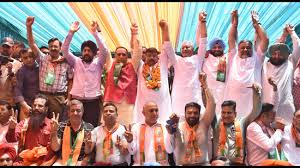‘If AAP loses Ludhiana West, they will be wiped off national scene… They won’t find their footing again’: Punjab BJP’s Sunil Jakhar

Punjab BJP president Sunil Jakhar has issued a bold warning to the Aam Aadmi Party (AAP). He claimed that if the party loses the Ludhiana West by-election, it could vanish from India’s national political scene. “They won’t find their footing again,” he said, calling this poll a decisive test for AAP.
The Ludhiana West constituency, situated in one of Punjab’s major urban hubs, has become more than just a local contest. It is now viewed as a symbol of AAP’s strength and staying power—both in the state and beyond.
AAP’s Future on the Line?
AAP came to power in Punjab in 2022 with a landslide win. But over the past year, criticism has grown. People have raised concerns over governance, law and order, and AAP’s confrontations with the Centre. For the party, a win in Ludhiana West could help recover lost momentum.
A defeat, however, may shake its foundation. Jakhar believes such a result would crush AAP’s dreams of becoming a national force. “People trusted them with change. But what have they delivered?” Jakhar asked at a press conference in Jalandhar. “If they can’t retain this seat, what chance do they have on the national stage?”
BJP’s Expanding Ambitions
Jakhar’s remarks reflect the BJP’s renewed focus on Punjab. The party wants to expand its reach in a state where it has long been a smaller player. After its breakup with the Shiromani Akali Dal, the BJP has tried to rebuild its identity—this time without a traditional ally.
Ludhiana West is now central to this effort. Jakhar, once a Congress leader, is pushing hard to reframe BJP as a fresh, serious contender in Punjab. “People are tired of false promises,” he said. “They want development, not drama. That’s what we offer.”
AAP Hits Back
AAP leaders responded quickly. Party spokesperson Malvinder Singh Kang dismissed Jakhar’s warning as political noise. “This is just the BJP’s frustration speaking,” Kang said. “The people of Punjab have seen the results of our work. From healthcare to free electricity, we’ve delivered.”
He added that the BJP’s presence in Punjab is weak and built only on empty slogans. “They’re desperate to stay relevant. But Ludhiana West won’t save them,” he said.
Still, many political experts agree the bypoll holds more meaning than a simple seat change. “It’s a litmus test,” said Prof. Amanjeet Singh of Panjab University. “A win would reinforce AAP’s public image. A loss could suggest its appeal is fading.”
Shifting Ground in Punjab
The political ground in Punjab has shifted dramatically in recent years. The Congress has struggled with infighting. The BJP is rebuilding. And AAP, once hailed as the alternative, now faces the heat of expectations.
The bypoll is turning into a clash of ideologies and leadership styles. BJP is campaigning on development and national unity. AAP is pushing its “Delhi-Punjab governance model.” Meanwhile, Congress is trying to regain lost credibility by promising stable, secular leadership.
For voters in Ludhiana West, this is not just about local issues. It’s about trust. “Last time I voted AAP,” said Manpreet Singh, a shopkeeper. “But I’m not sure now. There’s too much noise and not enough clarity.”
National Stakes
Jakhar’s bold prediction may seem extreme. But his comments reflect deeper anxieties in Indian politics. AAP has tried to expand into other states—Gujarat, Haryana, Madhya Pradesh—but has had mixed success. Punjab is its stronghold. Losing ground here could damage its credibility in newer regions.
BJP, on the other hand, wants to prove that it can grow in places like Punjab without traditional allies. A win would help that narrative. Congress is also watching closely. A solid performance could offer a path back into Punjab’s mainstream.
Each party sees Ludhiana West as a gateway—either to a comeback or collapse.
What’s Next?
Campaigns in Ludhiana West are heating up. AAP is promoting its work in education, healthcare, and social services. BJP is highlighting national security, economic development, and corruption-free governance. Congress is banking on voter fatigue with both ruling and opposition parties.
Rallies, door-to-door outreach, and social media campaigns are in full swing. Political leaders from all sides are making frequent visits. The Election Commission has deployed special observers to ensure a smooth process.
Regardless of who wins, one thing is clear: Ludhiana West is no longer just a local contest. It is a bellwether for what lies ahead in Punjab—and possibly for national politics.
Sunil Jakhar’s warning might prove exaggerated. But the outcome of this bypoll will send a strong message. The results will reflect not only voter mood but also whether AAP can still claim the space it once carved out as India’s new political hope.






